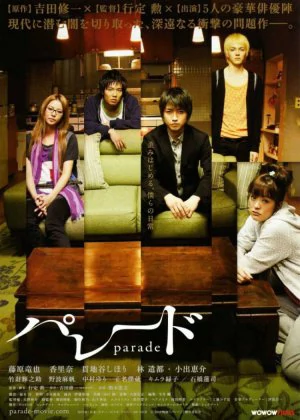Paredo

At first glance Parade may look like any other Japanese drama, and to some extent it is exactly that. But with each progressing segment something more unique develops. Something that could be called Yukisada's trademark magic, an almost translucent quality that differentiates him from other Japanese directors. It takes Parade a while to become truly engrossing, but by the end of the film it should prove enough to leave you with a satisfied feeling.

While Isao Yukisada (Women Play Twice) never really got his international career off the ground (things did look up when he released Go, but nothing much happened after that), he kept his directing career active in Japan. One has to know where to look to get a hold of his films (as they lack any decent form of advertising in the West), but most of the time it is worth the trouble of seeking out his recent work. Yukisada often manages to sneak interesting themes and perspectives into his films, wrapping them into slightly challenging yet still easy to digest formats.
It isn't until late into the film that the true extent of the dramatic stretches reveal themselves to the audience, giving an interesting dimension to the previous events without actually relying on a big, explosive twist. Parade follows a group of five young individuals who share a flat together. The film is constructed out of five separate segments, each segment focusing on one specific character and his relation to the group. While this does fragment the film in different chapters, there is enough interaction with other characters to keep Parade from becoming a mere selection of related short films.
While the different characters are still quite normal by themselves and can't be described as true outcast material, this group of youngsters is obviously a selection of people living on the fringes of society, a little lost and without any clear goals in life. They aren't true rebels, they just try to get on by in a society they care very little about. Their flat is their recluse, away from the world outside, surrounded by like-minded (though in some cases very different) people.

Visually Parade is a decent film, but visual appeal is definitely not the main attraction here. There are some nice shots from time to time and the lighting is above average (especially during the night scenes), but the overall look can become a bit drab when Yukisada focuses too much on pure storytelling. The art direction is pretty slick and professional, but clearly constructed as to not distract from the characters and the bottom line Yukisada is trying to communicate.
The soundtrack follows this same line of thought. Sure enough it's a decent selection of music tracks, but it does absolutely nothing more than simply supporting the existing atmosphere of different scenes. The music is never leading or memorable, chances are you won't even remember any individual musical cues or songs the moment the credits start to fade from the screen. It's a decent score, but at the same time it's nothing more than fitting background noise.
With so much riding on the characters, it's reassuring to see that the acting is top notch. Even Tatsuya Fujiwara (not a big fan here) puts in a commendable performance. The acting is overall strong, with Karina and Kento Hayashi shining brightest, while the other three are definitely not far behind. The five of them really bring their characters to life and also manage to nail the entity of the group, making sure the effect of the dramatic climax of the film is maximized. As for supporting roles, there aren't many worth mentioning for the simple reason that Parade keeps a very clear focus on its main characters.

Yukisada does very little to hide the message of his film, in the final segment there is a conversation between Hayashi and Fujiwara that explains the crux of Parade. The scenes after that go on to illustrate this conversation. It may be a bit direct for some people, on the other hand these final scenes are incredibly strong and poignant so it didn't really bother me. It's an incredible ending, somehow lifting everything that came before to a higher level, even warranting a second viewing.
Parade is quite a lengthy film and the first hour you might be excused for wondering what all the fuzz is about. But the second hour is strong and the length of the film is used to expand the relationship between the main characters. It may not be an audiovisual masterpiece but it's professionally crafted, well acted and sporting a refreshingly unique ending that gives the film the extra flair lacking in the first hour. It's a shame Yukisada slipped away from the international scene because his films do deserve a larger audience.